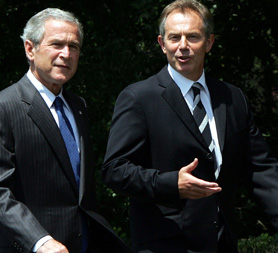Chilcot ‘disappointed’ over block on Blair’s Iraq memos
The man chairing the inquiry into the Iraq war says he is “disappointed” that secret messages between the former Prime Minister Tony Blair and President Bush have been blocked from publication.
Cabinet Secretary Sir Gus O’Donnell has told the inquiry that their release could damage the UK’s international relations.
But the committee chairman, Sir John Chilcot, says that – as some of the documents have been referred to in the memoirs of both Mr Blair and President Bush – he and his fellow members are “disappointed”.
In a statement before today’s resumed hearing of the inquiry, Sir John said: “We sought disclosure of key extracts, which illuminate Prime Minister Blair’s position at critical points. The Cabinet Office did not agree with this disclosure.
“The inquiry is disappointed that the Cabinet Secretary was not willing to accede to its request. This means that – in a narrow but important area – the inquiry may not always be able to publish, as fully as it would wish, the evidential basis for some of its comments and conclusions.”
The Cabinet Office tonight made clear that Sir Gus had consulted Tony Blair before blocking publication of the messages, which have been seen by the five committee members.
Sir John wrote to the Cabinet Secretary last month asking for parts of the messages to be declassified and made public under the terms of the committee’s protocol on releasing documents.

“The inquiry regards it essential in order to fulfil its terms of reference, to be able to chronicle the sequencing of discussions on Iraq between the UK Prime Minister and the President of the United States,” he said.
“It seems to us that it is both contrary to the terms of the protocol and, in light of the disclosures in recent memoirs, unnecessary to prevent the inquiry from being able to do this.
“In the inquiry’s view it is essential, if it is to produce a reliable account, that it is able to quote extracts from the records of what the Prime Minister said to President Bush in their discussions on Iraq.”
But Sir Gus – who will give evidence to the inquiry next week – replied that the Cabinet Office attached “particular importance” to protecting channels of communication between the Prime Minister and the US President.
“I judge that their release would, or would be likely to, damage the UK’s international relations.” Cabinet Secretary Sir Gus O’Donnell
“My view is that the public interest is not best served by their release,” he added. “I judge that their release would, or would be likely to, damage the UK’s international relations.”
Sir John then wrote again, warning that Mr Blair would face “firm questioning” from the committee when he appears before it again this Friday.
“Given Mr Blair’s decision to disclose some of the content in A Journey (his memoirs), the committee is likely to be disappointed if he is less forthcoming in his evidence to us,” he wrote.
“This approach is also likely to increase the length of the hearing.”
Our Political Editor, Gary Gibbon writes: If you are wondering why the Chilcot Inquiry might be interested in Tony Blair's letters to President Bush you get a flavour of it here, in Inquiry member Sir Roderick Lyne's questioning of Alastair Campbell last year.
Sir Roderic Lyne: "My final question is that in these interactions with the White House, presumably the Prime Minister wrote to President Bush from time to time. Did you see that correspondence?"
Alastair Campbell: "Yes."
Sir Roderic: "Did he tell President Bush in writing during 2002 that he would support the President if he took military action?"
Alastair Campbell: "The Prime Minister wrote quite a lot of notes to the President and I would say that the tenor of them was that, as I have said earlier, we share the analysis, we share the concern, we are absolutely with you in making sure that Saddam Hussein is faced up to his obligations and that Iraq is disarmed. If that can't be done diplomatically and it has to be done militarily, Britain will be there. That would definitely be the tenor of his communications to the President."
Sir Roderic: "So without conditions?"
Alastair Campbell: "It is not a question of being without conditions, because if you are saying that along that route and bear in mind, when it..."
Sir Roderic: "Let's not go all the way along the route."
Alastair Campbell: "You have just asked me the question. If I can answer it: 12 years after the first resolution, six months after George Bush takes it to the United Nations, four months after 1441, I think it was pretty measured and I think the Prime Minister was, all the way through, trying to get it resolved without a single shot being fired.
"In the end, he is the guy at the top who has to make the judgments with all the advice that he gets about how best to do that, but that was his motivation right the way through."
The Cabinet Office said that all Government documents relating to the Iraq War had been made available to the Iraq Inquiry. But it stood by its refusal to allow the publication of the Blair memos, a decision which had been taken after consultation with the former Prime Minister.
A spokeswoman said: “There is an established convention covering papers of a previous administration whereby former ministers would normally be consulted before release of papers from their time in government.”
The inquiry resumed its hearings today after a break of almost six months, with evidence from a former head of the RAF, Air Chief Marshal Sir Glenn Torpy. But all eyes are already turning towards Friday’s appearance by Mr Blair, particularly after last night’s revelations of further documents from the former Attorney General, Lord Goldsmith, suggesting that the former Prime Minister’s comments were at odds with legal advice.